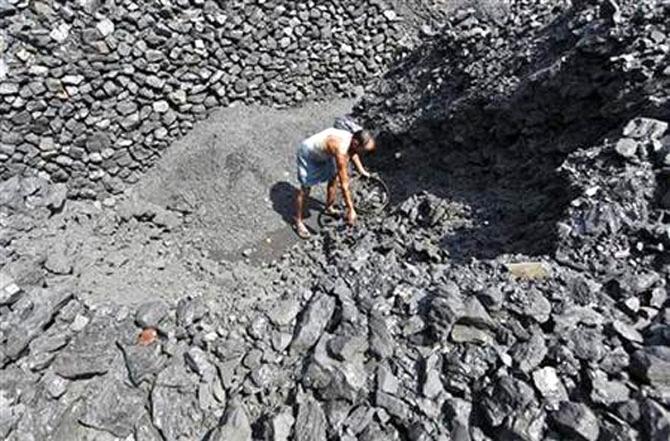India always faces a Hobson’s choice as far as feeding coal-fired generators goes — even if the government is reluctant to admit it.

The country cannot do without shipping in the world’s most polluting fuel from overseas.
And it will continue to do so unless it decides to reduce demand by forcing citizens, farmers and businesses to live without electricity for part of the day, or use diesel generators to fire facilities.
Given that India imports over 85 per cent of its crude oil needs, that’s not much of a choice, either.
India needs over a billion tonnes of coal to meet local needs.
But domestic production has never come close to satiating demand from generators.
This fiscal, thermal coal imports will increase to as much as 185 million tonnes, a near record, from around 153 million tonnes a year earlier, according to estimates by CRISIL Research.
Overseas purchases at 197 million tonnes were at an all-time high in 2019-20 valued at Rs 91,500 crore, according to the coal ministry.
Imports of non-coking coal this fiscal may cost Rs 2.5 trillion, CRISIL reckons.
“Non-coking coal imports are expected to increase despite continued elevated pricing for the imported varieties,’’ said Hetal Gandhi, director, CRISIL Research.
“The reason for the recovery in imports is a pass-through provision for imported coal for the power segment coupled with industry cycle recovery requiring continued coal imports to fulfill demand,” Gandhi added.
Coal imports continue to be a bugbear for the Modi government after the state married ideology with business.
Agreed, aatmanirbharta, or reducing reliance on foreign suppliers, improves energy security, and allows the government to keep control over prices.
Otherwise, one is left at the mercy of mines in Indonesia, South Africa and Australia.
But little planning has gone into efforts to eliminate India’s coal imports.
The government offers ambitious production targets, which are hardly met, and on the basis of which imports are discouraged.
Coal India, the world’s largest coal producer, was given a target in 2015 to produce a billion tonnes of the fuel by 2020, nearly twice its then output.
That target had to be pushed back by five years to 2025.
Consumers bear the brunt of New Delhi’s poor planning.
A reluctance to import led to low coal stocks and a power crisis in 2016-17.
The power sector reduced coal imports by 40 per cent last fiscal from a year earlier — leading to outages in October and blackouts in March 2022 after Coal India failed to deliver sufficient domestic fuel.
Coal India would require a12.4 per cent annual growth in production to meet this fiscal’s target, said Jayanta Roy, group head and senior vice president, ICRA.
“The last time Coal India came close to achieving double-digit growth was in FY2016, when it registered a 9 per cent annual growth."
The task at hand is quite challenging, and if Coal India witnesses large production slippages, then coal imports could increase going forward, Roy added.
But imports by Indian utilities typically come at an inopportune time of record coal rates.
Utilities pared imports last fiscal when coal prices were less than half of what they are today, and are scrambling for the fuel when rates are soaring, said a Singapore-based coal trader.
Indian utilities tend to buy at high prices, and when the market falls, end up holding high cost inventories, the trader said.
He compared India’s buying with China, which is constantly in the market, averaging out costs.
Also, China tends to exit purchases when prices are high, with its absence eventually bringing prices down, he added.
Consumers will see bigger bills from higher coal costs, while traders will gain from a policy allowing state-run utilities to blend 10-15 per cent imported fuel with domestic produce.
For instance, state-owned NTPC, India’s largest power generating company, would see its fuel cost go up to Rs 7-8 per kilowatt hour from importing coal as against Rs 2 per unit from buying domestic coal from Coal India, increasing power tariffs by 50-70 paisa a unit for consumers, Business Standard has reported.
NTPC has awarded contracts to import 6.25 million tonnes of coal to Adani Enterprises, valued Rs Rs 8,308 crore.
In March, when the coal crisis erupted, Adani won contracts to import 5.75 million tonnes of coal, worth Rs 8,422 crore, Business Standard reported.
Coal India, the world’s biggest producer of the fuel, has floated tenders for the first time to import as much as 8.4 million tonnes worth around Rs 10,700 crore.
The tenders include an option to bring in another 6 million tonnes, worth Rs 7,700 crore.
Adani is one of the bidders along with other Indian traders.
“Ironically, imported coal was the fallback fuel for power generation contributing to India’s energy security in 2021-22,” said Barnik Maitra, managing partner, Arthur D Little India.
“In reality, the frantic embrace of imported coal illustrates that what is unaffordable politically and economically is ‘no power’ rather than expensive power."
Coal can be freely imported into India (under the Open General Licence).
The biggest chunk brought in by coal traders is thermal coal that goes into power plants, cement plants, sponge iron facilities and industries.
Blending meets the needs of most generators but around 8 per cent of the coal-fired capacity only runs on imported coal, according to the coal ministry.
Indonesian, Australian and South African coal grades have a share of 50, 20 and 20 per cent, respectively, on an average in total non-coking coal imports for India, CRISIL estimates.
It expects Indonesian coal prices to stay at $75-$80 a tonne from $78 a tonne last fiscal, and the Australian variety, which is of higher calorific value, to remain at $310-$320/tonne, nearly 85 per cent higher.
Global coal prices have trebled in the past year, sending the coal import bill in May higher by 156 per cent in the year to $10.2 billion.
It’s tough to see this recede much anytime soon, Maitra said.
India’s coal import bill last fiscal stood at $30.6 billion, accounting for around 16 per cent of the merchandise deficit, according to ICRA.
“With seaborne coal prices being significantly higher now following the Russia-Ukraine war, India’s rising coal import bill is expected to exert pressure on the current account deficit in the current year as well," Roy said.











